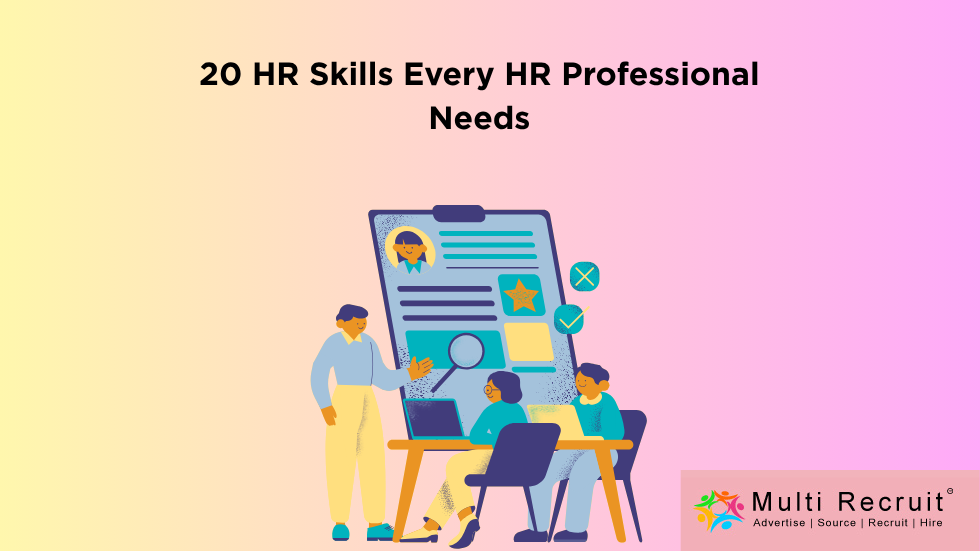In the fast-evolving world of human resources, staying ahead requires a dynamic skill set that blends strategic thinking, technological proficiency, and emotional intelligence. As we approach 2025, HR professionals must adapt to digital transformation, hybrid work environments, and a growing emphasis on employee well-being and diversity. At Multi Recruit, we understand the critical role HR plays in shaping organizational success. This guide outlines 20 essential HR skills for 2025, equipping professionals to thrive in a competitive landscape.
What are the HR Skills Every HR Professional Needs?
1. Strategic Thinking
HR professionals must align people strategies with business goals. Understanding organizational objectives and using data-driven insights to address challenges ensures HR initiatives drive growth.
2. Data Analytics
Proficiency in data analytics is non-negotiable. HR professionals should leverage tools like HRIS and BI platforms to analyze workforce trends, predict retention risks, and optimize recruitment.
3. AI Literacy
AI is transforming HR processes, from recruitment to performance management. Familiarity with AI-driven tools, such as applicant tracking systems, enhances efficiency while maintaining human oversight.
4. Emotional Intelligence
Emotional intelligence (EI) fosters trust and resolves conflicts. By understanding and managing emotions, HR professionals create supportive work environments that boost engagement.
5. Effective Communication
Clear verbal and written communication bridges the gap between employees and management. Tailoring messages for diverse audiences ensures clarity and fosters collaboration.
6. Active Listening
Listening attentively to employee concerns builds trust. HR professionals who practice active listening can address issues empathetically, enhancing workplace harmony.
7. Conflict Resolution
With 20% of HR time spent managing conflicts, negotiation and mediation skills are vital. Encouraging open dialogue resolves disputes while balancing employer and employee needs.
8. Adaptability
The ability to pivot in response to technological advancements or workforce shifts is crucial. Adaptable HR professionals maintain operational smoothness during change.
9. Cultural Awareness
Promoting diversity, equity, and inclusion (DEI) requires cultural sensitivity. Understanding diverse backgrounds fosters inclusive environments that reduce bias and strengthen teamwork.
10. Change Management
Guiding organizations through transitions, such as digital adoption or restructuring, demands proactive planning. HR professionals must manage resistance and provide support like training or counseling.
11. Talent Acquisition
Strategic recruitment involves crafting compelling job descriptions and using multiple channels like social media to attract top talent. Collaboration with hiring managers ensures cultural fit.
12. Employee Engagement
With 59% of global workers disengaged, boosting morale is critical. HR professionals should implement feedback tools and recognition programs to enhance satisfaction.
13. Training and Development
Designing tailored learning programs aligns employee growth with organizational goals. Upskilling opportunities, valued by 61% of U.S. employees, improve retention.
14. Technological Proficiency
Mastery of HRIS, LMS, and digital performance tools streamlines processes. Tech-savvy HR professionals enhance remote work management and digital learning.
15. Compliance Knowledge
Navigating evolving labor laws and regulations is essential. HR professionals must ensure policies align with legal standards to mitigate risks.
16. Organizational Skills
Managing payroll, contracts, and employee records requires strong time management and attention to detail. Organized HR professionals meet deadlines efficiently.
17. Discretion and Confidentiality
Handling sensitive data, such as employee records or disputes, demands discretion. Maintaining confidentiality builds trust and upholds ethical standards.
18. Leadership Development
Supporting new managers through training and feedback tools addresses leadership gaps. HR professionals empower leaders to motivate teams effectively.
19. Employee Well-being
Comprehensive wellness programs, including mental health resources and fitness initiatives, boost productivity. In 2025, 88% of employees prioritize well-being alongside salary.
20. Continuous Learning
Staying updated on HR trends through blogs, certifications, and professional networks ensures relevance. Lifelong learning supports career longevity and organizational agility.
How to Develop These Skills
At Multi Recruit, we believe in empowering HR professionals to excel. Here’s how to build these skills:
- Online Courses and Certifications: Platforms like AIHR and CHRMP offer courses in data analytics, AI integration, and DEI. Certifications enhance credibility and expertise.
- On-the-Job Training: Engage in projects that stretch your abilities, such as implementing HRIS or leading DEI initiatives. Collaborate with experienced colleagues to gain insights.
- Professional Networks: Join organizations like SHRM to access webinars, conferences, and mentorship opportunities. Networking keeps you informed on industry trends.
- Mentorship and Coaching: Seek guidance from seasoned HR leaders to refine soft skills like emotional intelligence and conflict resolution.
- Continuous Learning: Regularly read HR blogs, research papers, and newsletters. Allocate time for professional development to stay ahead of emerging trends.
Why These Skills Matter in 2025
The HR landscape in 2025 is defined by digital transformation, employee-centric strategies, and a focus on inclusivity. At Multi Recruit, we’ve seen firsthand how skilled HR professionals drive organizational success by fostering engaged, diverse, and adaptable workforces. Skills like AI literacy and data analytics enable HR to make informed decisions, while emotional intelligence and cultural awareness create positive employee experiences. As businesses navigate hybrid work and talent scarcity, HR professionals who master these competencies become strategic partners, not just administrators.
Conclusion
The role of HR is more strategic than ever, requiring a blend of technical, interpersonal, and strategic skills. By mastering these 20 skills, HR professionals can lead with confidence, adapt to disruption, and drive meaningful change. At Multi Recruit, we’re committed to supporting HR professionals through innovative recruitment solutions and insights that align with 2025’s demands. Start building these skills today to future-proof your career and elevate your organization.
Ready to take your HR career to the next level? Visit Multi Recruit for resources, job opportunities, and tools to thrive in 2025 and beyond.
